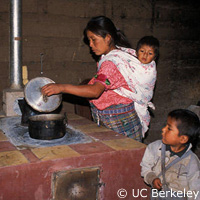Study finds chimney-stoves help cut risk of pneumonia
People who cook over open fires and dirty cookstoves are at a higher risk of suffering from illnesses than those who do not, new international research shows. Presented in the journal The Lancet, the findings reveal a 33% drop in the number of reported pneumonia cases in children living in homes with smoke-reducing chimneys on the cookstoves. Pneumonia is the leading cause of death for children aged 5 and under; around 43% of the global population, representing approximately 3 billion people, use open fires and cookstoves as their primary source of cooking and heating. This translates to a serious health risk being posed for children daily via indoor air pollution. 'This study is critically important because it provides compelling evidence that reducing household woodsmoke exposure is a public health intervention that is likely on a par with vaccinations and nutrition supplements for reducing severe pneumonia, and is worth investing in,' explains Professor Kirk Smith from the School of Public Health at the University of California, Berkeley (UC Berkeley) in the United States, and the lead researcher of the RESPIRE ('Randomized exposure study of pollution indoors and respiratory effects') study. The RESPIRE partners, from Guatemala, Norway, the United Kingdom and the United States, collaborated with rural communities in the western highlands of Guatemala, randomly assigning households with a pregnant women or a young infant either to receive a wood stove with a chimney or to continue cooking with traditional open wood fires. The sample consisted of 265 children in chimney-stove homes and 253 children in the control homes. Children diagnosed with pneumonia numbered 149 in the chimney-stove homes and 180 in the open-fire homes. Severe pneumonia cases totalled 72 in the chimney-stove group and 101 in the control group. The team identified how using chimneys to allow the cooking smoke to escape the confines of the home helped reduce the number of severe pneumonia cases. The researchers believe this was triggered by a drop in smoke levels. 'The amount of smoke exposure babies were getting from the open woodfire stoves is comparable to having them smoke three to five cigarettes a day,' explains Professor Smith, whose research in this field began 30 years ago. 'The chimney stoves reduced that smoke exposure by half, on average.' Commenting on the study, internationally renowned infectious diseases expert Dr Arthur Reingold of UC Berkeley, who is not affiliated to the RESPIRE study, says: 'There is a huge burden of disease and death due to child pneumonia, and there aren't a lot of good interventions out there. Randomised controlled trials are frequently demanded by funding agencies and decision makers before they are willing to make substantial investments in new technologies or strategies, and this study provides the needed evidence of an intervention that works.'For more information, please visit:The Lancet:http://www.thelancet.com/RESPIRE:http://ehs.sph.berkeley.edu/guat/?page_id=22
Countries
Guatemala, Norway, United Kingdom, United States



